语用意义的理解与表达
语言学概论第七章语言的使用.
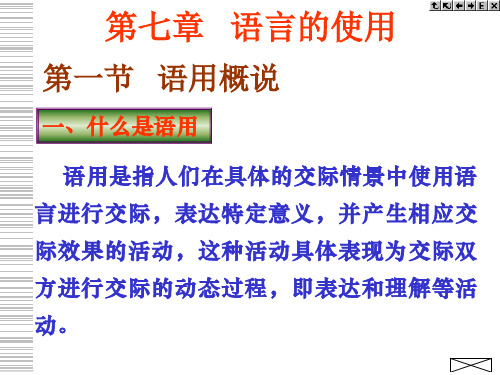
关于量的准则 ——信息不足 例如: 妈妈:暑假作业完成了吗? 儿子:算术做完了。 作者:我这篇小说写得怎么样? 编辑:我觉得字迹挺工整。 ——信息过量 甲:刚才给你打电话的是谁? 乙:是我的女朋友。她又漂亮、又能干、 又活跃,她们单位的人都叫她做“演员出身的 女强人”。
描写语用学的基本观点是:
⑴随着对音位学、句法学、语义学等学科知识 研究的加深,人们了解到语言中的有些现象 只能从语用角度入手才能得到满意的解释。 ⑵用语用学去解释语言现象比用语义学去解决 显得更充分、更简便。 ⑶句子意义与说话人使用这个句子表示的实际 含义有时是有距离的,语用学却帮助听话人 接上这段距离。 ⑷语境因素能决定人们对话语作出不同反应和 使句子结构的功能产生变化。
1977年荷兰正式出版发行了《语用学杂志》, 标志着语用学作为一门新兴学科得到了确认。此后, 1983 年莱文森的《语用学》和利奇的《语用学原 则》出版,1985年9月在意大利召开了国际语用学 研讨会, 1986 年初成立了国际语用学学会。并确 定把《语用学杂志》和《语用学和其他学科》作为 它的学术刊物。
判别以相关准则为基础,进而考察其他准则:
完全相关——遵循“质”(不需语用推理)
——违反“质” 合作 不愿
提供答案……
部分相关——违反“量”(过量或不足)
——违反“质”
——违反“方式” 不提供答案
施为性行为可分为五大类—— 1.表态性的施为性行为 如许诺、警告、恫吓、威胁等,即发话 人表示自己的态度,将要做什么或采取什么 样的行动。例如: “我保证一定把教室打扫干净。” “明天你要是迟到,以后我就不让你参 加了。” 前一句是许诺,后一句是警告。
语言学中的语义理解与语言表达研究
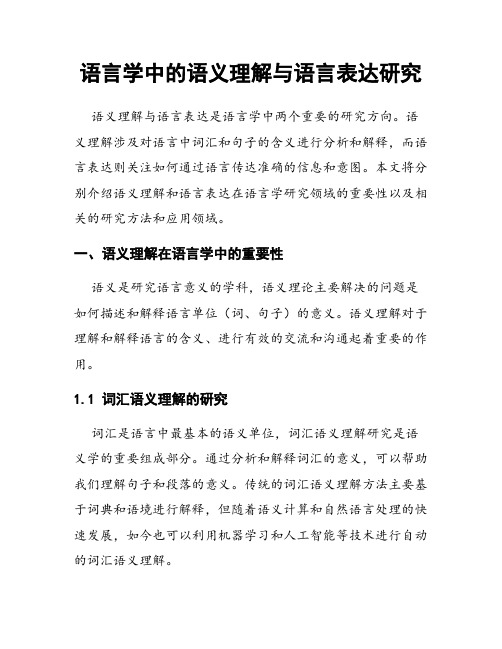
语言学中的语义理解与语言表达研究语义理解与语言表达是语言学中两个重要的研究方向。
语义理解涉及对语言中词汇和句子的含义进行分析和解释,而语言表达则关注如何通过语言传达准确的信息和意图。
本文将分别介绍语义理解和语言表达在语言学研究领域的重要性以及相关的研究方法和应用领域。
一、语义理解在语言学中的重要性语义是研究语言意义的学科,语义理论主要解决的问题是如何描述和解释语言单位(词、句子)的意义。
语义理解对于理解和解释语言的含义、进行有效的交流和沟通起着重要的作用。
1.1 词汇语义理解的研究词汇是语言中最基本的语义单位,词汇语义理解研究是语义学的重要组成部分。
通过分析和解释词汇的意义,可以帮助我们理解句子和段落的意义。
传统的词汇语义理解方法主要基于词典和语境进行解释,但随着语义计算和自然语言处理的快速发展,如今也可以利用机器学习和人工智能等技术进行自动的词汇语义理解。
1.2 句子语义理解的研究句子是语言中的基本单位,句子语义理解是语义学的关键研究方向。
句子的语义理解涉及对句子含义的分析和解释,包括句子的逻辑结构、语法成分和语义关系等。
句子语义理解的研究可以应用于机器翻译、信息检索和自动问答等领域,提高机器对语言的理解能力和语义推理能力。
二、语义理解的研究方法语义理解的研究方法主要包括语义分析、语义推理和语义表示等。
2.1 语义分析语义分析是语义理解的基础,通过分析语句的语法成分和上下文语境,确定句子的语义含义。
语义分析方法包括结构分析、语义角色标注和词义消歧等。
结构分析通过分析句子的句法结构,确定句子中词语之间的语法关系;语义角色标注则通过标记句子中的语义角色,如施事者、受事者和动作等;而词义消歧则是通过上下文推断词语的具体意义。
2.2 语义推理语义推理是指通过推理和推断,从已知信息中推导出新的语义信息。
语义推理方法包括逻辑推理、推理规则和神经网络等。
逻辑推理主要基于逻辑学原理,运用比较直观的推理规则进行推理;推理规则则是根据已有语义知识和规则,通过推理推导出新的语义信息;而神经网络则通过构建复杂的神经网络模型,从大规模数据中学习和推理语义信息。
语言学概论第五章语义和语用

男人:男性的成年人。 女人:女性的成年人。
(1)用来对比的应该是指称同一种类 对象的词语
(2)语义特征分析应该先从指称事物 最小类别成员的一组词语开始,如有需 要,再进一步扩大对比分析的范围。
最小语义场的确定可参考有关对象 的分类,在许多情况下,最小语义场与 某一对象的最小类别相应。例如:
1、词语搭配受语法规则的制约 2、词语搭配受语义条件限制 3、词语搭配受每个语言的词义系统限
制 4、词语搭配考虑社会的使用习惯 5、词语搭配涉及词义的各种附加色彩
和修辞效果
李老师看到了王老师,王老师也看到了 李老师。
李老师看到了一头猪,这头猪也看到李 老师。
李老师看到了一块石头。
她姐姐是一个单身汉。(×) 她:[第三人称][女性] 单身汉: [-女性]……
语调形式等来表达的意义。 1、词所指称的事物及其结成的关系
(1)词汇意义 (2)关系意义 语法关系意义
语义关系意义 (3)句式意义 2、说话人对这些事物及其关系的总态度。 (语气意义)
(二)语用意义
句义一方面取决于该句子的语言 意义,一方面又取决于语境等句子的外 部因素。
二、词语的搭配
正确的词语搭配是使句子有意义的基本 条件。
请把门关上!
预设:门是开着的。
说话者具有支使听话者的条件。
说话者知道听话者有能力做这件
事。
(2)预设的语用特征 1. 预设的合适性 预设的真实性是包含该预设的语
句合适(真实有效)的前提条件。 2.其次,预设具有已知性,是已知
信息。 3.预设具有可取消性。
我绝不会让我的妻子伤心。 预设:我有妻子。 如果我有妻子,我绝不会让我的妻子伤心。
[上圆下平、用发酵的面粉蒸成、无馅] [上圆下平、用发酵的面粉蒸成、有馅]
英语词汇学详细阐述词的意义与词的语用意义不同之处。
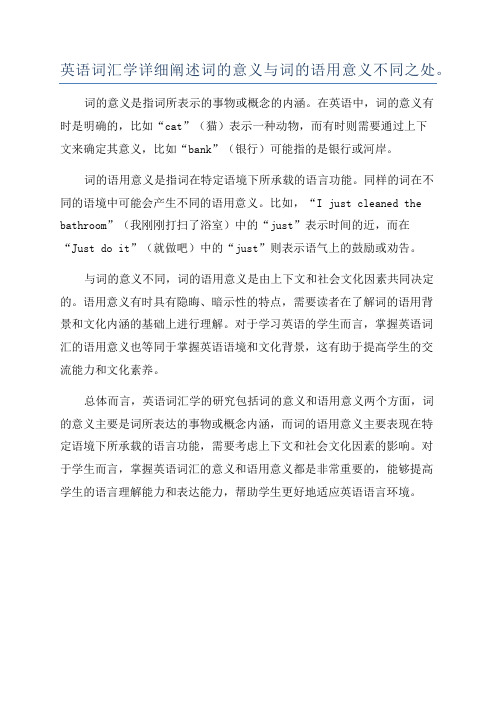
英语词汇学详细阐述词的意义与词的语用意义不同之处。
词的意义是指词所表示的事物或概念的内涵。
在英语中,词的意义有
时是明确的,比如“cat”(猫)表示一种动物,而有时则需要通过上下
文来确定其意义,比如“bank”(银行)可能指的是银行或河岸。
词的语用意义是指词在特定语境下所承载的语言功能。
同样的词在不
同的语境中可能会产生不同的语用意义。
比如,“I just cleaned the bathroom”(我刚刚打扫了浴室)中的“just”表示时间的近,而在
“Just do it”(就做吧)中的“just”则表示语气上的鼓励或劝告。
与词的意义不同,词的语用意义是由上下文和社会文化因素共同决定的。
语用意义有时具有隐晦、暗示性的特点,需要读者在了解词的语用背
景和文化内涵的基础上进行理解。
对于学习英语的学生而言,掌握英语词
汇的语用意义也等同于掌握英语语境和文化背景,这有助于提高学生的交
流能力和文化素养。
总体而言,英语词汇学的研究包括词的意义和语用意义两个方面,词
的意义主要是词所表达的事物或概念内涵,而词的语用意义主要表现在特
定语境下所承载的语言功能,需要考虑上下文和社会文化因素的影响。
对
于学生而言,掌握英语词汇的意义和语用意义都是非常重要的,能够提高
学生的语言理解能力和表达能力,帮助学生更好地适应英语语言环境。
语言学概论 语用概述
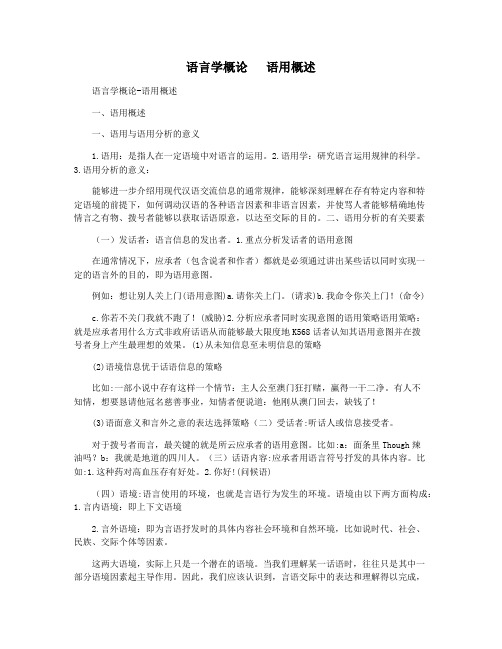
语言学概论语用概述语言学概论-语用概述一、语用概述一、语用与语用分析的意义1.语用:是指人在一定语境中对语言的运用。
2.语用学:研究语言运用规律的科学。
3.语用分析的意义:能够进一步介绍用现代汉语交流信息的通常规律,能够深刻理解在存有特定内容和特定语境的前提下,如何调动汉语的各种语言因素和非语言因素,并使骂人者能够精确地传情言之有物、拨号者能够以获取话语原意,以达至交际的目的。
二、语用分析的有关要素(一)发话者:语言信息的发出者。
1.重点分析发话者的语用意图在通常情况下,应承者(包含说者和作者)都就是必须通过讲出某些话以同时实现一定的语言外的目的,即为语用意图。
例如:想让别人关上门(语用意图)a.请你关上门。
(请求)b.我命令你关上门!(命令)c.你若不关门我就不跑了!(威胁)2.分析应承者同时实现意图的语用策略语用策略:就是应承者用什么方式非政府话语从而能够最大限度地K568话者认知其语用意图并在拨号者身上产生最理想的效果。
(1)从未知信息至未明信息的策略(2)语境信息优于话语信息的策略比如:一部小说中存有这样一个情节:主人公至澳门狂打赌,赢得一干二净。
有人不知情,想要恳请他冠名慈善事业,知情者便说道:他刚从澳门回去,缺钱了!(3)语面意义和言外之意的表达选择策略(二)受话者:听话人或信息接受者。
对于拨号者而言,最关键的就是所云应承者的语用意图。
比如:a:面条里Though辣油吗?b:我就是地道的四川人。
(三)话语内容:应承者用语言符号抒发的具体内容。
比如:1.这种药对高血压存有好处。
2.你好!(问候语)(四)语境:语言使用的环境,也就是言语行为发生的环境。
语境由以下两方面构成:1.言内语境:即上下文语境2.言外语境:即为言语抒发时的具体内容社会环境和自然环境,比如说时代、社会、民族、交际个体等因素。
这两大语境,实际上只是一个潜在的语境。
当我们理解某一话语时,往往只是其中一部分语境因素起主导作用。
词的语用意义

每个人的生活都有酸甜苦辣; 4 移就性相仿 在语言表达过程中;把适用于说明某事物性状的词语用于另一事物; The room was easily traced by the noise that was coming from it It didn’t sound studious noise
由于red和read过去分词谐音;本句实际上说从来没有人读它
2 主观体验性Subjective experientiality
1个人的主观理解
南瓜pumpkin
中国人尤其是老一辈的人;看到南瓜可能会想起苦日子;南瓜 与艰难的岁月联系在一起; 而美国人会想到Thanksgiving Day Halloween;南瓜与幸福生活紧密相连;
2词的感情色彩意义 a 一组意义相同 而语音形式和感情色彩各异的词
意义 人群;群众
身体超重 体重过轻
中性 crowd
overweight underweight
褒义
gathering; assembly portly slim
贬义 mob
tubby skinny
b 词的本义在具体语境中发生感情色彩意义的变化
尽管如此;我们还不清楚说话人的真正用意是什么;然而一旦 有具体的语境介入;hand在各句中的语用意义就明确了: 假设在画廊里;a句的语用意义是画只能眼看;不可手触; 假设在某修理部;b句的语用意义是未经培训;缺乏技术; 假设在教室里;c句的语用意义是请你用手将我要用的笔递给 我; 假设在教师办公室里;d句的语用意义是学生已经交上了自己 的课外作业;
二 语用意义的特点
1 原词附属性Etymological subsidiarity 2 主观体验性Subjective experientiality 3 词义不确定性Meaning uncertainty 4 概念临时性Conceptual temporality 5 语境共生性Contextual interdependency
语义和语用的区别举例

语义和语用的区别举例现代汉语中的语义,可从词义的范围来理解。
语义是指意义,就是字面的意义,对人和事物有意义的话或者表达一定意义的话。
语用是指在一定的语境下,为了表达特定的目的,根据具体的情况而采取的话语行为或者是交际策略。
我们一般称为语用。
根据语义可以区分不同的语言系统。
例如汉语、英语、阿拉伯语等,因为它们的使用环境不同,所以语义也不相同。
这样我们就可以根据语义来划分不同的语言系统。
又比如,根据语义还可以分出一些复句,根据语义还可以判断是否为合成词,等等。
而语用只是其中的一部分。
1。
语义有两种基本形式:语法意义和语用意义。
所谓语法意义,是指语言单位所反映的客观事物的本质属性的意义,即语言的语法功能。
比如:高,表示高度的意义。
所谓语用意义,是指语言单位在表达过程中所显示的语言社会作用的意义。
例如:明天刮风,后天下雨。
你干吗去?表达了语用意义。
2。
语法意义和语用意义互相依存、互相渗透。
在不同的语言中,语法意义和语用意义的差异常常很大。
例如:他刚从美国回来,身体健康,很年轻。
表达了语法意义。
但是语用意义却与它大不相同。
他年轻,是什么年龄呢?还有哪些信息呢?还可以怎么说?是不是应该加个修辞手法呢? 3。
语法意义和语用意义是并存的,不是完全独立的。
所以,通过语法分析而找到的意义未必都是语用意义,而通过语用分析而得到的意义也未必都是语法意义。
二者之间有时难以截然分开。
关于这点,请看《修辞学发凡》一文的第九章和第十章。
对此,我不再赘述。
4。
正确地理解语法意义和语用意义,需要运用语言材料加以说明。
要理解一个语法项目,必须知道其具体的语法结构。
因此,了解语义的另一种基本形式——语用意义,才能进一步弄清楚所说的话是什么意思。
5。
语法意义和语用意义之间没有必然联系,不存在语义层次问题。
这里所说的“修辞格”主要是指借助辞格把抽象意思具体化、形象化的方法。
辞格作为一种修辞现象,历来被许多学者所重视。
其中,有一些辞格已经进入了语法规则,只是还没有成为一种单独的修辞手段。
语言学知识_语用学
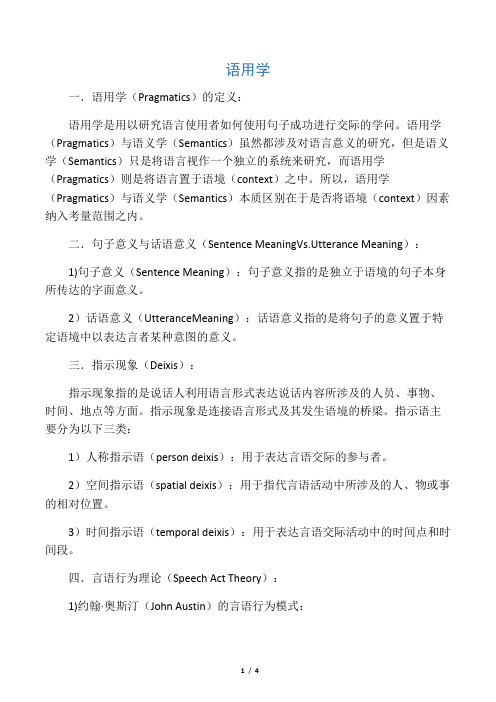
语用学一.语用学(Pragmatics)的定义:语用学是用以研究语言使用者如何使用句子成功进行交际的学问。
语用学(Pragmatics)与语义学(Semantics)虽然都涉及对语言意义的研究,但是语义学(Semantics)只是将语言视作一个独立的系统来研究,而语用学(Pragmatics)则是将语言置于语境(context)之中。
所以,语用学(Pragmatics)与语义学(Semantics)本质区别在于是否将语境(context)因素纳入考量范围之内。
二.句子意义与话语意义(Sentence MeaningVs.Utterance Meaning):1)句子意义(Sentence Meaning):句子意义指的是独立于语境的句子本身所传达的字面意义。
2)话语意义(UtteranceMeaning):话语意义指的是将句子的意义置于特定语境中以表达言者某种意图的意义。
三.指示现象(Deixis):指示现象指的是说话人利用语言形式表达说话内容所涉及的人员、事物、时间、地点等方面。
指示现象是连接语言形式及其发生语境的桥梁。
指示语主要分为以下三类:1)人称指示语(person deixis):用于表达言语交际的参与者。
2)空间指示语(spatial deixis):用于指代言语活动中所涉及的人、物或事的相对位置。
3)时间指示语(temporal deixis):用于表达言语交际活动中的时间点和时间段。
四.言语行为理论(Speech Act Theory):1)约翰·奥斯汀(John Austin)的言语行为模式:英国哲学家约翰·奥斯汀(John Austin)于20世纪50年代提出的言语行为模式区分了言有所述(constative)和言有所为(performative)。
随后,他又对原先的理论进行了发展,放弃了言有所述(constative)和言有所为(performative)的区分,发展出了新的言语行为模式。
词语理解理解词语的意义与用法
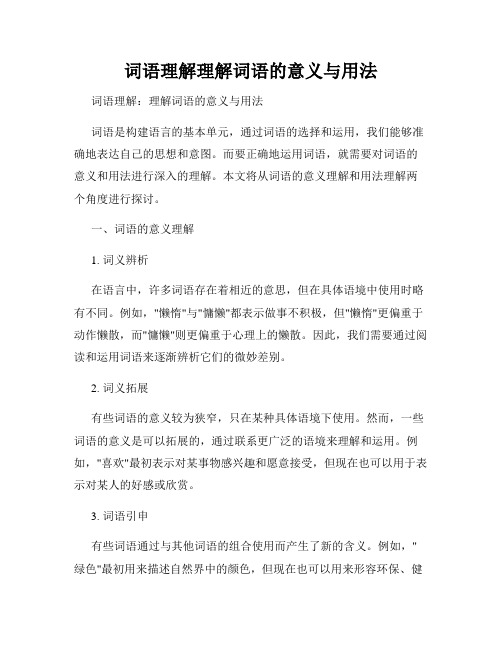
词语理解理解词语的意义与用法词语理解:理解词语的意义与用法词语是构建语言的基本单元,通过词语的选择和运用,我们能够准确地表达自己的思想和意图。
而要正确地运用词语,就需要对词语的意义和用法进行深入的理解。
本文将从词语的意义理解和用法理解两个角度进行探讨。
一、词语的意义理解1. 词义辨析在语言中,许多词语存在着相近的意思,但在具体语境中使用时略有不同。
例如,"懒惰"与"慵懒"都表示做事不积极,但"懒惰"更偏重于动作懒散,而"慵懒"则更偏重于心理上的懒散。
因此,我们需要通过阅读和运用词语来逐渐辨析它们的微妙差别。
2. 词义拓展有些词语的意义较为狭窄,只在某种具体语境下使用。
然而,一些词语的意义是可以拓展的,通过联系更广泛的语境来理解和运用。
例如,"喜欢"最初表示对某事物感兴趣和愿意接受,但现在也可以用于表示对某人的好感或欣赏。
3. 词语引申有些词语通过与其他词语的组合使用而产生了新的含义。
例如,"绿色"最初用来描述自然界中的颜色,但现在也可以用来形容环保、健康等其他方面。
这种词语的引申使得我们能够更加灵活地运用词汇来传递自己的意思。
二、词语的用法理解1. 语法搭配词语的用法往往与其所处的句法结构和语法规则有关。
例如,"大"一词在形容词的用法中通常用于修饰可数名词单数,而不与复数名词一起使用。
因此,我们需要了解和掌握各种词语在不同语法结构中的用法要求,以避免语法错误。
2. 语用功能除了基本的语法用法外,词语还具有丰富的语用功能。
例如,表达请求时常用的词语有"请"、"希望"等,表达感谢时常用的词语有"谢谢"、"感谢"等。
了解词语的语用功能能够帮助我们在交流中更好地表达自己的意愿和情感。
3. 文化隐喻在不同的文化背景中,同一个词语往往有着不同的隐喻意义。
从语义语法语用三个层面认识体

从语义、语法和语用三个层面认识体语言是人类交流的重要工具,语言中的词汇、语法结构以及它所表达的语用意义都可以通过三个层面进行认识。
本文将以三个层面的分析方法,对语言的语义、语法和语用进行深入探讨,以更好地理解人类交流中的语言特点。
一、语义层面语义是指语言中单词或短语所表示的意思。
语义广泛地涵盖了词汇、句子和语篇的含义。
在语义层面分析的时候,需要认识不同词汇之间的关系以及不同句子的隐含意义。
1.词汇义和词间关系语言的词汇是由不同的单词组成的,这些单词具有不同的意思,称为词汇义。
同时,词汇之间还存在一些关系,例如同义词、反义词、近义词、超义词、下义词等等。
我们可以通过分析词汇的具体意义及其与其他单词的关系,来更好地理解语言的语义。
举个例子,当我们说“我今天感觉很累”,这里“累”就是一个词汇,它表示我们对身体疲惫的感受。
但是,如果我们换用近义词“疲倦”,就可以表达出相同的意思。
此外,如果我们使用“不累”这个反义词,则表达出的就是相反的含义。
2.句子意义与逻辑句子是语言的基本单位,它通过语义意义的构建来表达一定的含义。
但是,在句子中有些含义是隐含的,需要通过逻辑推理来理解。
例如,“我将来会见你”,这句话表面上只是表示未来的一个时间点将会和你见面,但是当我们结合上下文推断,也可以理解成“我们将来有个约会”,这就涉及到句子的逻辑关系。
3.语篇分析语篇是一段话语或对话中一系列语句的汇总,它对单句含义的解释和补充,在语用层面中也起着至关重要的作用。
在语篇的层面分析中,我们需要理解句子与句子之间的逻辑和语义关系,以便更好地理解整段话语的含义。
二、语法层面语法是语言中用来控制句子形式和结构的规则。
语法足以使一句话变得有意义,而不仅仅是一些随意排列的单词。
在语法层面的分析中,我们需要理解句子中的不同成分和其在句子中的位置。
1.句子成分在语法分析中,我们需要考虑句子中的主语、谓语、宾语、定语、状语等成分。
如果一个成分在句子中缺失,那么就可能会导致句子的意思和含义发生变化。
怎样体会句子含义
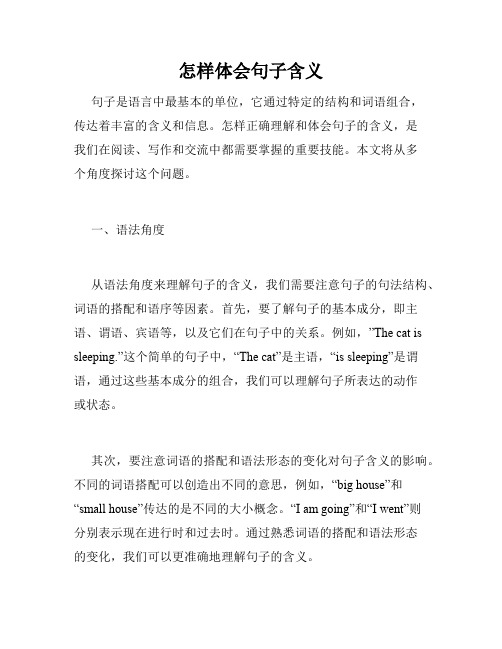
怎样体会句子含义句子是语言中最基本的单位,它通过特定的结构和词语组合,传达着丰富的含义和信息。
怎样正确理解和体会句子的含义,是我们在阅读、写作和交流中都需要掌握的重要技能。
本文将从多个角度探讨这个问题。
一、语法角度从语法角度来理解句子的含义,我们需要注意句子的句法结构、词语的搭配和语序等因素。
首先,要了解句子的基本成分,即主语、谓语、宾语等,以及它们在句子中的关系。
例如,”The cat is sleeping.”这个简单的句子中,“The cat”是主语,“is sleeping”是谓语,通过这些基本成分的组合,我们可以理解句子所表达的动作或状态。
其次,要注意词语的搭配和语法形态的变化对句子含义的影响。
不同的词语搭配可以创造出不同的意思,例如,“big house”和“small house”传达的是不同的大小概念。
“I am going”和“I went”则分别表示现在进行时和过去时。
通过熟悉词语的搭配和语法形态的变化,我们可以更准确地理解句子的含义。
二、语义角度句子的语义是指句子所表达的意义和信息。
在理解句子的语义时,我们需要考虑词语的词义、上下文的语境以及语言的隐含含义等因素。
首先,要准确理解词语的词义。
有时,一个词语有多种意思,我们需要根据上下文来确定正确的词义。
例如,“bank”一词可以指银行,也可以指河岸。
其次,要注意上下文的语境对句子含义的影响。
上下文中的其他词语和信息可以帮助我们更清晰地理解句子所表达的意思。
例如,“I saw a man with a telescope”中的“telescope”可以是望远镜,也可以是眼镜,“根据上下文的不同,我们可以确定正确的词义。
此外,在理解句子含义时,还需要注意语言的隐含含义。
有时,句子表面上的含义并不等同于它的真实含义。
通过细致地分析句子中的暗示、比喻、反讽等修辞手法,我们可以更深入地理解句子所传达的信息。
三、语用角度句子的语用是指句子在交际中所达到的目的和产生的效果。
第五章语义和语用

有的换喻有特定的出处: 而立 不惑 知天命 古稀 泰山 东床
词的派生不止以上两种方法: a.特指:“喜事”:一切高兴的事。现特指结婚。 b.谐音法:“二百五”“半封(半疯)”、“气管炎-妻管严”
本章的内容安排
语义层面
词汇语义:词汇的性质和构成、词义的一般特点、 词义间的各种关联、词的语义特征和 语义场
句子语义 :句义和词汇形式的关系、句义与人 类经验的关系、句义与说话人和交际 现场的关系、语义学中的一些重要概念
语用层面:从语用的角度说明话语中意义的最终表达与语境中 各要素(特别是语言使用者)之间的各种关联。语 用方面的重要概念。
金牌 银牌 铜牌
(下位词、下义词)
1.词义的上下位关系指词义反应的现象之间具有包含和被包含
的关系:
上位义更具有概括性,所反映的现实比下位义更多;而下位
义的概念义内涵属性更丰富,除了继承上位义的所有属性外,
还有自己特有的属性。
2.词义的上下位关系是可以有
层次的。
艺术
3.语言中的上下位关系大致等
同于逻辑上的种属关系,但又 不完全同于逻辑上的种属关系。 文学 绘画 戏剧 音乐 舞蹈
二、同义关系
等义词和近义词 同义词之间的关系
甲乙重合(等义词) 甲乙基本重合(近义词)
所谓同义词就是指几个语音形式不同而意义基本相同或相 近的词。
下面的关系不是同义关系
甲乙 不是同义关系
甲乙之间是包含关系:a.上下位关系:指称大类事物的词和指 称大类事物中某一小类的词。 Man-boy、fruit-apple、鸟-麻雀
第五章 语义和语用
汉语形容词的语义与语用分析
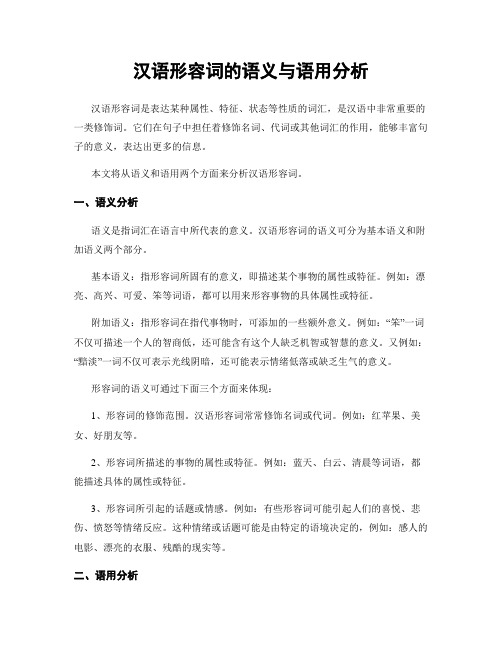
汉语形容词的语义与语用分析汉语形容词是表达某种属性、特征、状态等性质的词汇,是汉语中非常重要的一类修饰词。
它们在句子中担任着修饰名词、代词或其他词汇的作用,能够丰富句子的意义,表达出更多的信息。
本文将从语义和语用两个方面来分析汉语形容词。
一、语义分析语义是指词汇在语言中所代表的意义。
汉语形容词的语义可分为基本语义和附加语义两个部分。
基本语义:指形容词所固有的意义,即描述某个事物的属性或特征。
例如:漂亮、高兴、可爱、笨等词语,都可以用来形容事物的具体属性或特征。
附加语义:指形容词在指代事物时,可添加的一些额外意义。
例如:“笨”一词不仅可描述一个人的智商低,还可能含有这个人缺乏机智或智慧的意义。
又例如:“黯淡”一词不仅可表示光线阴暗,还可能表示情绪低落或缺乏生气的意义。
形容词的语义可通过下面三个方面来体现:1、形容词的修饰范围。
汉语形容词常常修饰名词或代词。
例如:红苹果、美女、好朋友等。
2、形容词所描述的事物的属性或特征。
例如:蓝天、白云、清晨等词语,都能描述具体的属性或特征。
3、形容词所引起的话题或情感。
例如:有些形容词可能引起人们的喜悦、悲伤、愤怒等情绪反应。
这种情绪或话题可能是由特定的语境决定的,例如:感人的电影、漂亮的衣服、残酷的现实等。
二、语用分析语用是指语言在实际交际中所发挥的作用。
汉语形容词在交际中起到丰富语言表达的作用,因此可以进行语用分析。
在语用分析中,我们需要关注以下两个方面:1、形容词的修饰对象。
形容词的表达往往与所修饰的名词或代词有很大关系。
例如:“漂亮的女孩”和“漂亮的地方”所表达的含义是不同的。
2、形容词的修辞效果。
在汉语中,形容词具有很强的修辞效果,例如:夸张、比喻、简洁等。
例如:“天真无邪”、“冰清玉洁”等使用了比喻手法,给人留下深刻的印象。
除此之外,语用分析还需要考虑下面几个方面:1、形容词与其他修饰词之间的关系。
汉语中常常使用多个修饰词来修饰一个名词,这些修饰词之间可能存在“并列”、“串联”、“递进”等关系。
第五章__语义和语用讲解

语言的意义一涉及语言形
式如何与它所指代的现实世
界发生联系。一涉及语言与 现实世界中哪一类现象,这
使用者的关系。
一层次的意义是语言学研究
的内容。
语义学
“天气真热!”
说话人与听话人的关系不同, 也许是刚从空调房间出来而 发的感叹,也许是为打发长 时间等车的无聊应酬,也许 是委婉地请听者开窗透气。
一般的、简单的东西,舍去了许多细节。 模糊性——一个词的意义所指的现象大致有一个范围,
没有明确的界限。 全民性——使用同一种语言,词的意义就是共同的。
第二节 词义的各种关系
一、一词多义
单义和多义是指一个词只有一种意义或多种意义。
1.单义词,顾名思义,只有一个意义。像“猫”“羊”等都是
单义词。一个词在开始的时候往往是单义的。单义词在一 种语言中往往是极少数。 术语(行星、光年;海拔、纬度; 微积分、原子能)一般都是单义词。专有名词(北京大学、 鲁迅)以及一部分常见事物的名称(太阳、月亮)和新词 也是单义的。 注意:单纯词中单义词少,合成词中单义词多。
• 反义词的两种类别
• 1)相对反义词。反义词所反映的对立中间留 下空白,可以插进别的成员。如:冰—冷— 凉—温—热—烫, 大—中—小,赞成—弃权—反对 此类反义词前可加程度副词,否定一方不等 于对方。反义是人们的主观态度和习惯所决 定的,并不一定是科学意义上的相反和对立。 如“黑”和“白”一般认为是一对反义词, 但从光学的角度分析,“黑”是由三原色构 成的,“白”是由赤橙黄绿青蓝紫七色构成 的,没有任何对立和矛盾的关系。
对于近义词,更重要的是找出它们之间的细微差 别,才能准确地理解各自表达的意义并准确的 使用。近义词的细微差别可以归纳为下面几个 方面:
让“语用”离小学生更近点

让“语用”离小学生更近点语言是人类交流的载体,语言运用则是一门需要长期学习和不断提高的技能。
在小学阶段,语言学习是非常重要的一部分,它直接关系到孩子的语言表达能力和认知能力的发展。
在目前的小学语文教育中,很多学生对语言运用的“语用”概念还不够清晰,让“语用”离小学生更近点是非常必要的。
我们需要清楚地了解“语用”的概念。
简单来说,语用是指语言的使用方式和目的。
也就是说,它主要关注的是人们在不同的语境中如何使用语言。
在不同的场合中,我们可能会使用不同的语言表达方式;在不同的人际交往中,我们可能会使用不同的语言策略等等。
要让“语用”离小学生更近点,我们首先需要引导他们明白语言并不只是一种单纯的词语组合,更是一种传递思想,表达情感的工具。
我们可以通过一些具体的教学方法和活动来让“语用”更贴近小学生的实际生活。
可以通过情景对话的方式,让学生在具体的情境中体验和理解语言的使用方式。
老师可以设计一些生活情境,鼓励学生模拟真实的交流场景,让他们在真实的语言环境中感受语用的重要性。
还可以利用小组合作的方式,让学生在小组中共同讨论和解决问题,鼓励他们积极运用语言进行交流,从而提高他们的语用能力。
我们也可以结合一些实际的例子和故事来引导学生理解“语用”的重要性。
可以选取一些富有生活情感和故事性的文章,让学生通过阅读和讨论,感受语言表达的魅力和对情感的传递。
通过这种方式,学生可以更好地理解语用在生活中的应用,并且在学习语文的过程中也能更加享受阅读的乐趣。
还可以在课堂教学中增加一些语用方面的知识和技能的训练。
在课堂上进行一些口语训练和表达能力的培养,或者是针对一些常见的语用问题进行讨论和解决。
通过这些方式,可以帮助学生更好地掌握语言的使用规范和技巧,提高他们的语用能力。
让“语用”离小学生更近点是非常重要的。
通过引导学生理解语用的概念,结合具体的教学方法和活动,以及加强课堂内外的实践训练,可以帮助学生更好地掌握语言的使用规范和技巧,提高他们的语用能力。
话语分析中的意义和语用
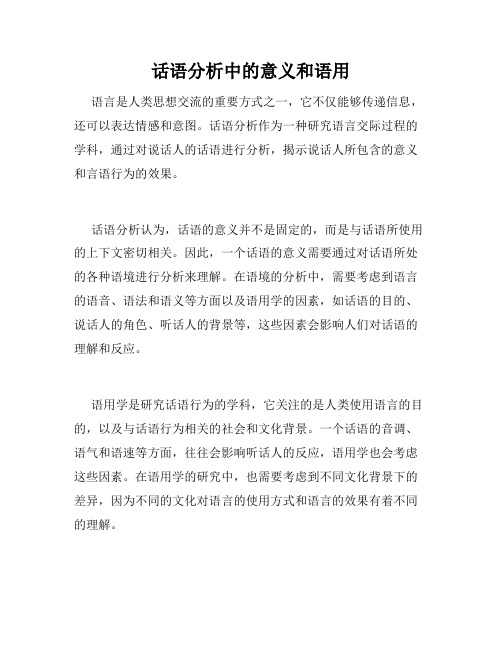
话语分析中的意义和语用
语言是人类思想交流的重要方式之一,它不仅能够传递信息,还可以表达情感和意图。
话语分析作为一种研究语言交际过程的学科,通过对说话人的话语进行分析,揭示说话人所包含的意义和言语行为的效果。
话语分析认为,话语的意义并不是固定的,而是与话语所使用的上下文密切相关。
因此,一个话语的意义需要通过对话语所处的各种语境进行分析来理解。
在语境的分析中,需要考虑到语言的语音、语法和语义等方面以及语用学的因素,如话语的目的、说话人的角色、听话人的背景等,这些因素会影响人们对话语的理解和反应。
语用学是研究话语行为的学科,它关注的是人类使用语言的目的,以及与话语行为相关的社会和文化背景。
一个话语的音调、语气和语速等方面,往往会影响听话人的反应,语用学也会考虑这些因素。
在语用学的研究中,也需要考虑到不同文化背景下的差异,因为不同的文化对语言的使用方式和语言的效果有着不同的理解。
随着社会的发展,人们的话语行为也在不断发生变化,话语中
含有的意义也在不断地演变。
因此,话语分析和语用学的研究也
在不断地更新和深化。
在当今社会中,虚拟语境下的话语行为成
为了一个值得研究的话题。
网络聊天、微信和社交媒体等新兴的
交流方式,给传统的话语分析和语用学带来了新的挑战和机遇。
通过话语分析和语用学的研究,我们能够更好地理解和掌握语
言的使用方式和效果,避免沟通中的误解和不必要的冲突。
同时,也能够更好地应对不断变化的社会和文化环境,更好地发挥语言
的交际功能。
如何深刻理解“语言文字运用”
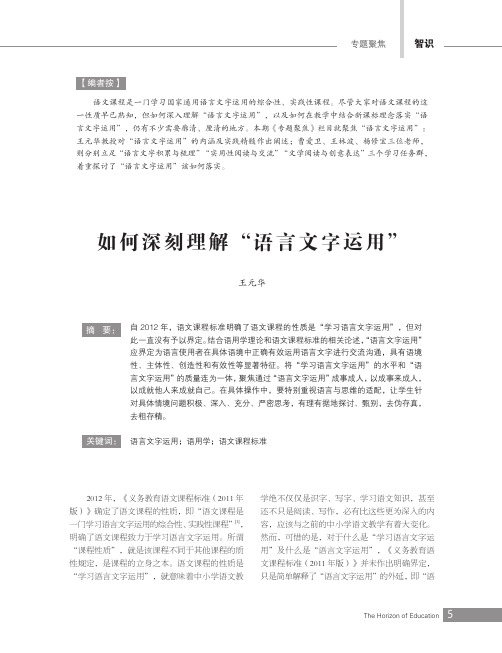
智识专题聚焦【编者按】语文课程是一门学习国家通用语言文字运用的综合性、实践性课程。
尽管大家对语文课程的这一性质早已熟知,但如何深入理解“语言文字运用”,以及如何在教学中结合新课标理念落实“语言文字运用”,仍有不少需要廓清、厘清的地方。
本期《专题聚焦》栏目就聚焦“语言文字运用”:王元华教授对“语言文字运用”的内涵及实践精髓作出阐述;曹爱卫、王林波、杨修宝三位老师,则分别立足“语言文字积累与梳理”“实用性阅读与交流”“文学阅读与创意表达”三个学习任务群,着重探讨了“语言文字运用”该如何落实。
自2012年,语文课程标准明确了语文课程的性质是“学习语言文字运用”,但对此一直没有予以界定。
结合语用学理论和语文课程标准的相关论述,“语言文字运用”应界定为语言使用者在具体语境中正确有效运用语言文字进行交流沟通,具有语境性、主体性、创造性和有效性等显著特征。
将“学习语言文字运用”的水平和“语言文字运用”的质量连为一体,聚焦通过“语言文字运用”成事成人,以成事来成人,以成就他人来成就自己。
在具体操作中,要特别重视语言与思维的适配,让学生针对具体情境问题积极、深入、充分、严密思考,有理有据地探讨、甄别,去伪存真,去粗存精。
语言文字运用;语用学;语文课程标准摘 要:关键词:2012年,《义务教育语文课程标准(2011年版)》确定了语文课程的性质,即“语文课程是一门学习语言文字运用的综合性、实践性课程”[1],明确了语文课程致力于学习语言文字运用。
所谓“课程性质”,就是该课程不同于其他课程的质性规定,是课程的立身之本。
语文课程的性质是“学习语言文字运用”,就意味着中小学语文教学绝不仅仅是识字、写字、学习语文知识,甚至还不只是阅读、写作,必有比这些更为深入的内容,应该与之前的中小学语文教学有着大变化。
然而,可惜的是,对于什么是“学习语言文字运用”及什么是“语言文字运用”,《义务教育语文课程标准(2011年版)》并未作出明确界定,只是简单解释了“语言文字运用”的外延,即“语如何深刻理解“语言文字运用”王元华智识专题聚焦言文字的运用,包括生活、工作和学习中的听说读写活动以及文学活动,存在于人类社会的各个领域”[2]。
精讲-第六章_语言的运用特点——语用
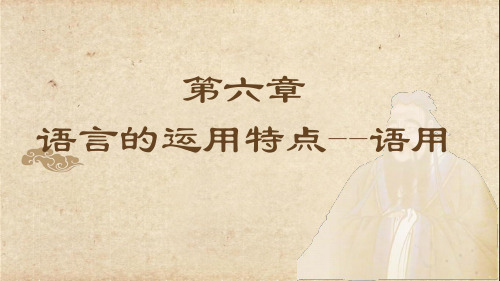
二、语境和语句意义
(二)言外语境的作用 1.用来解释词语和句子的具体所指意义。 例如:今天他又迟到了。(上班、上学、约会?) 2.用来解释特殊词义和句义 例如:宁在宝马车里哭,不在自行车上笑。 3.用来解释不但超出了词语的义项义和句子的命题义,而且需要揣 摩才能理解的背后意义。 例如:现在是21世纪了。(陈述事实、回答问题、应该与时俱进)
三、语境和词语所指
3.根据指示词语的类别,指示意义主要包括人称指示、时间指示、地 点指示。有的学者还提出了“语篇指示”和“社交指示”。 例如对话—— A :订书机在你那儿吗?我这儿有东西要订。 B :你来拿吧。订书机不在桌上,在我左边的抽屉了。 这里的“你、我、那儿、这儿、桌上、左边”都表示了明确的人称 、地点指示意义,说话双方都有赖语境才可理解。 《围城》中孙柔嘉对方鸿渐的称呼:方先生、您、你、你这个人
有指:名词有指称性; 无指:名词没有指称性(可以看做是一种特殊的指称); 任指:有指名词与任意的一些或某些对象联系的指称; 全指:有指名词与某类对象的全体联系的指称; 定指:说话人和听话人都知道的有指名词与某个或某些对象联 系的指称; 不定指:至少是听话人不知道的有指名词与某个或某些对象联 系的指称。
重难点和考点
• 本章的重、难点和常考知识点 – 语用的性质(常考单选题、多选题) – 语境的类型、语境和语句意义的关系、语境和词语所 指的关系(常考多选题、简答题) – 会话的“合作原则”和“礼貌原则”、违反会话准则 产生的会话含义(常考单选题、术语解释题、简答题) – 蕴含义和预设义(常考单选题、简答题、分析题)
知识点测评题
【简单题】简述什么是语言的运用以及如何认识语用的性质。 【答案】 语用即语言的运用,是指人们在一定的交际环境中对语言的实际运用 。要想有效地使用语言,不仅要掌握好语言的结构规则,还要了解语 言的使用规律,这中规律就是“语用”。 语用主要包括以下一些性质: (1)情境性。语言离不开具体使用的环境。语言使用的环境既包括由 交际双方的言辞构成的上下文语境,也包括言辞之外的各种主客观因 素构成的言语环境。
句子的含义是什么意思

句子的含义是什么意思文章1:句子的含义是什么意思?句子是语言交际的基本单位,它是表达思想、传递信息的最小单位。
那么,句子的含义是什么意思呢?知识点一:句子的语法意义句子的意义是由语法意义和语用意义共同构成的。
语法意义是指句子所包含的主谓宾等语法关系,也是通过语法规则来确定的。
例如,“他在公园散步”这个句子的语法意义就是主语“他”+谓语“在公园散步”。
知识点二:句子的语用意义句子的语用意义是指语言表达者根据具体情境而选择的适当词语和语言风格所传达的信息。
例如,“他花了一千元买了个新手机”这个句子的语法意义已经表达了主语“他”花了一千元买了新手机这一事实,而语用意义则更深入地传达了他购买新手机的目的、他的态度和情感等。
知识点三:句子的意义多样性同一句子在不同情境下的意义也可能不同,这是由人与人之间的文化、社会、心理等差异所导致的,比如“我爱你”这句话,对于不同的人,其含义也可能大不相同。
综上所述,一个句子的含义既包括语法意义,也包括语用意义;在不同情境下,其意义也可能多样化。
因此,在进行语言交际时,需要综合考虑语法和语境,才能准确地理解和传达信息。
文章2:什么是句子的含义?句子是语言交际中的基本单位,它承载着人们的思想、情感和意图等信息。
那么,句子的含义究竟是什么呢?知识点一:句子的意义是有玄机的句子的意义不仅仅是单纯的语言符号所能表达的,其中还包含了人们对事物的理解、思考和判断等玄妙因素。
例如,“他是一名教师”这个句子不仅仅是说明了他的职业身份,还包含了人们对教师职业的传统观念和认知等玄妙因素。
知识点二:句子的意义是文化的体现句子的意义还反映了所处文化背景的差异,例如“冰心独具慧眼,尖锐严谨”这个句子在不同的文化背景中,其意义可能会有不同的解释。
在中国文化背景下,这个句子意为冰心的思想独具慧眼,严谨准确;而在西方文化背景下,翻译为“Ice Heart is highly perceptive and has a sharp and rigorous mind”,旨在强调冰心的洞察力和理性思维。
语用意义的理解与表达

• 语言符号的语用意义主要包括以下几种: • 1. 表征意义 indicative meaning • 2. 表达意义 expressive meaning • 3. 联想意义 associative meaning • 4. 祈使意义 imperative meaning • 5. 社交意义 social meaning
• Version 2: … “He is always beating about the bush// talking in a roundabout way.”
• 由于党的农业政策,我国千千万万农民走上了 致富的道路。
• Thanks to the policies of the Communist Party of China on agriculture, millions of peasants in China are getting rich.
• Version 2: Fight when you can win, move away when you cannot win.
• 郭彩娣笑了,赞赏他的口才说:“说话真 会绕弯子。”
• Version1:Guo Caidi smiled and said appreciatively: “He certainly knows how to keep you guessing.”
• Version 2
• After exchanging a few polite remarks when we met, he observed that I looked “fat”, and after having made that complimentary remark he started a violent attack on the revolutionaries.
- 1、下载文档前请自行甄别文档内容的完整性,平台不提供额外的编辑、内容补充、找答案等附加服务。
- 2、"仅部分预览"的文档,不可在线预览部分如存在完整性等问题,可反馈申请退款(可完整预览的文档不适用该条件!)。
- 3、如文档侵犯您的权益,请联系客服反馈,我们会尽快为您处理(人工客服工作时间:9:00-18:30)。
• 一见面是寒暄,寒暄之后说我“胖了”, 说我“胖了”之后即大骂其新党。 • When we met, after exchanging a few polite remarks he said I was fatter, and after saying that immediately he started a violent attack on the revolutionaries.
• 联想意义: 指语言符号唤起的联想以及它 所暗示的概念或印象。 • 例如: • She is a cat. • Chicken-hearted VS 胆小如鼠 • Sheepish/goatish VS 绵羊、山羊
• 祈使意义:指发讯人企图改变收讯人行为 或意向,具体表现为禁止、警告、命令等。 • 如广告语、标识语、警示语等。
• 美国语言学家Martin Joos 把美国英语分为 五种语言变体: • 1、刻板的 (frozen) • 2、正式的 (formal) • 3、商谈式的 (consultative) • 4、随便的 (casual) • 5、亲昵的 (intimate)
• 由于党的农业政策,我国千千万万农民走上了 致富的道路。 • Thanks to the policies of the Communist Party of China on agriculture, millions of peasants in China are getting rich.
Social Meaning:register (语域)
• 语体是同一语言使用者在不同场合使用的 该语言的变体。所谓“变体”是人们在不 同场合下对自己的言语所做的调整。语体 与使用场景、主题、交际对象以及交际时 的情绪等有关。 • 例如:
• 自称在不同场合有不同的表达方式:
• 我、吾、鄙人、某人、不佞、本人、咱、 人家等等 • Q:在当代语境中,以上措词分别有什么样 的语用含义?
• 这位导演别具匠心,在剧中安排了一场演 员走到观众中的戏。 • The director showed his ingenuity by arranging a scene in which the actors went into the audience of the play. • 这家伙老是别出心裁,招摇撞骗。 • That guy is always trying to be different so as to swindle and bluff.
• Capitalism stresses innovation, competition and individualism. • 资本主义强调的是创新、竞争和个人至上。 • Individualism has been the secret ingredient in developing his chain of fashion stores. • 讲求个性化是他发展时装连锁店的一大秘诀。 • To many Americans the westward march illustrates a legacy of individualism.
• “这断子绝孙的阿Q!”远远地听到小尼姑的 带哭的声音。 • “Ah Q, may you die sonless!” sounded the little nun’s voice tearfully in the distance.
• Version 2: • “Ah Q, may you die sonless!” sounded the little nun’s most vicious curse tearfully in the distance.
• 汉语词语一般具有稳定的感情色彩,或带 褒义,或带贬义,情感意义容易区分。有 些情况下,词的褒贬含义也需要借助语境。 例如: • 她尽说漂亮话。 • 她的活儿• 1、忠于原文的立场,而不能以译者的立场 为基准; • 2、依据语境准确判断词语的褒贬; • 3、注意指称意义相同而情感意义不同的 “假朋友”。
• • • • • •
语言符号的语用意义主要包括以下几种: 1. 表征意义 indicative meaning 2. 表达意义 expressive meaning 3. 联想意义 associative meaning 4. 祈使意义 imperative meaning 5. 社交意义 social meaning 柯平《英汉与汉英翻译教程》
表达意义:词的褒贬(affective meaning )
• 词语的情感色彩存在于各种语言中,一般 可以分为:褒义词(appreciative)、贬义词 (pejorative)、以及中性词(neutral)。词语的 情感意义的使用是说话人对客观对象有情 感评价,有不同的好恶。 • 例如: • 他像孩子般的天真。 • 他幼稚得像个孩子。
• Version1:Guo Caidi smiled and said appreciatively: “He certainly knows how to keep you guessing.” • Version 2: … “He is always beating about the bush// talking in a roundabout way.”
• It’s unwise of you to be jealous of others and speak evil of others. • Miss Zhang’s beauty is the envy of a lot of women. • We should turn the idle bread eaters into productive workers. • To be lazy is considered a disgrace in our society.
Exercise
• • • • • • • • 他们讲索取,我们讲奉献。 他追求的是真理,而她追求的是荣华富贵。 请神容易送神难。 这位是大名鼎鼎的范先生。 你不该嫉妒人,说别人的坏话。 不少女人嫉妒张小姐的美貌。 应把闲散人员变为生产工人。 在我们的社会里,懒散是一种耻辱。
• They preach taking from others, while we advocate giving to others. • What she seeks is truth, and what he hankers after is nothing but high position and great wealth. • It’s easier to call upon an evil spirit than send it away. • This is Mr. Fan, the historian.
• • • •
油漆未干,请勿触摸 刀片锋利,以免伤人 请勿触摸 竖放
• • • •
Wet paint! Sharp blade! Hands off! Upright !
• 社交意义:语言符号同建立、保持某种社 会关系有关的方面。 • 1、称谓:您、你、老张、张老 • 2、寒暄语:吃了吗? • 3、语域:刻板(frozen)、正式(formal)、商谈 式(consultative)、随便(causal)、亲昵 (intimate)
• Collins Dictionary: • Individualism: • 1. You use individualism to refer to the behavior of someone who likes to think and do things in their own way, rather than imitating other people. • 2. Individualism is the belief that economics and politics should not be controlled by the state.
• 一封赴宴后的感谢信: • It was extremely gracious of you to invite me, Lady Jones, and I’ve bags of fun. • 贾母责怪王熙凤又提起黛玉父母双亡的事 ,叫她“快别再提了”。 • Version one: so don’t reopen the subject. • Version two: so let’s have no more of it.
• Version 2 • After exchanging a few polite remarks when we met, he observed that I looked “fat”, and after having made that complimentary remark he started a violent attack on the revolutionaries.
• 由于两次世界大战的爆发,各国人民蒙受了极 大的灾难。 • People of all countries have suffered great calamities in consequence of the two World Wars
• (卢佳川)“但是,你这些想法和做法, 恐怕还是为了你个人吧?” • 道静蓦地站了起来:“你说我是个人主 义?”(杨沫《青春之歌》) • “Are you sure your thoughts and wishes aren’t determined by personal considerations?” he asked. • Daojing sprang to her feet. “Do you mean that I’m an individualist?”
• 他们忠心耿耿地报效于自己的祖国和人民。 • They served their motherland and people with loyalty and devotion. • 这些死心塌地的纳粹分子为他们的第三帝 国效命。 • These die-hard Nazis went all out to serve their Third Reich.
